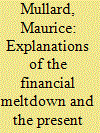| Srl | Item |
| 1 |
ID:
111659


|
|
|
|
|
| Publication |
2012.
|
| Summary/Abstract |
The credit rating agencies that dominated the ratings of mortgage-backed securities were Moody's and Standard & Poor's. The two agencies rated some 4.3 trillion dollars of bonds as triple AAA, yet within a period of 18 months these same rating agencies downgraded these bonds to below investment grade. This paper seeks to show that the ratings agencies business model, the issuer pays approach, led to major conflicts of interest with both the ratings agencies unable to walk away from a rating. The evidence given by analysts to Congressional Inquiries confirms a cultural revolution within the rating agencies, with analysts feeling unable to question the quality of a rating. Analysts who were described as being awkward by issuers were removed from the rating process. In the meantime, the income for the rating agencies increased from 3 billion dollars to 6 billion dollars, with the CEOs of the rating agencies receiving incomes comparable to the incomes to the CEOs of investment banks.
|
|
|
|
|
|
|
|
|
|
|
|
|
|
|
|
| 2 |
ID:
105866


|
|
|
|
|
| Publication |
2011.
|
| Summary/Abstract |
he concern of this article is to locate the unfolding literature that seeks to explain the present financial crisis into three dimensions of contestability. The major areas of disagreements between various authors include: the role of government; the issues of whether the recession was unavoidable or whether it was inevitable; and the area of ideas and ideals and how economic ideas shaped and influenced the policy process. These explanations include the pragmatists and all that literature that had a time dimension of major actors trying to produce policies that aimed to stabilise the financial markets. These policy makers did not have the benefit of hindsight but were concerned that the financial markets were so fragile that there was no other choice but for governments to intervene. By contrast, there were the market fundamentalists who argued that the pragmatists had got it wrong and were therefore highly critical of the Federal Reserve and the Treasury and tended to blame the recession on government housing policy. Institutionalists have argued that the regulatory system is broken, while structuralists tend to focus on growing income inequalities, the concentration of wealth and how the changing structure explains the recession in the sense that households took the avenue of higher debt on their homes to sustain higher levels of consumption. Finally, there is the Keynesian Collectivist argument that points to the limits of Rational Expectations and Efficient markets. No one really know who is right, but the fierce debate that is emerging is highly important in that each explanation seeks to provide a framework for policy making
|
|
|
|
|
|
|
|
|
|
|
|
|
|
|
|
| 3 |
ID:
099784


|
|
|
|
|
| Summary/Abstract |
The election of the Conservative-Liberal coalition in May 2010 provides the opportunity to start to map out the record of the Labour governments between 1997 and 2010. This paper deals with the specific question how the Brown/Blair governments performed on public expenditures when compared to the records of UK Labour governments since 1945. Did the public expenditure record of the 1997 represent a departure from that of previous Labour governments? This is important to ascertain since there are strongly held beliefs that New Labour was not committed to Labour's historic commitments of income redistribution and universal benefits. The analysis that follows is constructed around five major public expenditure programmes that reflect Labour's priorities. These include total expenditure, expenditure on health, education, housing and social security.
|
|
|
|
|
|
|
|
|
|
|
|
|
|
|
|
| 4 |
ID:
059984


|
|
|
|
|
| Publication |
Cheltenham, Edward Elgar Publishing, 2004.
|
| Description |
xvi, 218p.
|
| Standard Number |
1843765799
|
|
|
|
|
|
|
|
|
|
|
|
Copies: C:1/I:0,R:0,Q:0
Circulation
| Accession# | Call# | Current Location | Status | Policy | Location |
| 049326 | 327.1/MUL 049326 | Main | On Shelf | General | |
|
|
|
|